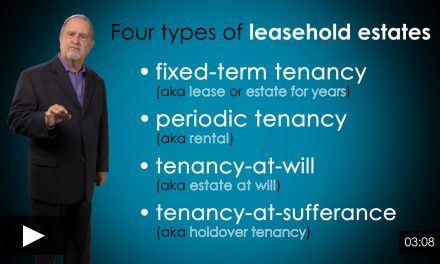Dubious real estate brokers are slicking their pockets in yet another way, as exposed by the Consumer Financial Protection Bureau’s (CFPB) recent bulletin.
The latest fad for California Bureau of Real Estate (CalBRE) licensed professionals, mostly employing brokers, looking to sidestep the Real Estate Settlement Procedures Act (RESPA) prohibitions is the use of marketing services agreements (MSA).
Brokers enter into MSAs with companies that provide services their buyers and sellers need to close real estate transactions involving a consumer mortgage origination, such as:
- mortgage lenders and loan brokers, known as mortgage loan originators (MLOs);
- title insurance companies;
- escrow companies;
- appraisal services;
- home warranty insurers; and
- home inspection companies.
When used lawfully, sales transaction providers use MSAs to employ third parties, generally marketing agencies, to advertise and promote their services. For example, promotional or educational events and services may be performed by a third party on behalf of a mortgage loan broker or lender or other provider so long as the third party, say a multiple listing service (MLS) broker for purposes of this RESPA avoidance scheme, is actually rendering services of equal value to the amounts paid under the MSA.
However, brokers and their agents often believe that by not asking for a referral fee, an agent is “leaving money on the table.” Thus, MSAs are created by brokerages with third-party providers to a sales transaction to drive brokerage-generated business exclusively to the provider in exchange for a referral fee. This activity is illegal under RESPA when the transaction includes the origination of a consumer mortgage.
Payment is limited to the value of the actual services provided as promotional, educational or rental activities. Specifically, the amount paid may not be received by the broker or agent in exchange for or contingent upon the broker or agent’s referral of a buyer or seller to an MLO, escrow or title insurer, or other provider in a transaction in which a consumer mortgage is originated. [12 Code of Federal Regulations §1024.14(vi)]
However, the CFPB has received an increase in complaints made by consumers, competing MLOs and other providers, and real estate professionals who are yet uncorrupted and do not take these illegal referral fees. These complaints claim MSAs are a cover entered into by providers for payment of kickbacks to real estate agents in violation of RESPA’s anti-kickback regulations. Further, a second fee for the agent’s referral of their client to a provider in expectation of some manner of payment which is not reported to the client violates CalBRE real estate law.
Lenders, MLOs, real estate licensees and title companies are among the top exploiters of MSAs as a disguised method of paying and receiving these unlawful referral fees, or kickbacks. Brokerages pass good leads on to mortgage companies and title reps for referral fees in various forms.
Kickbacks may be disguised by providers and brokers as payment in a form other than a referral fee, such as an office holiday party, catered lunch for the brokerage office or the rental of a cubby for the provider’s representative when the values involved are nowhere near the amount of the money paid to the broker.
RESPA prohibitions: How kickbacks work
Kickbacks in consumer mortgage transactions – sales with financing for a buyer-occupant of a home – have been prohibited since the inception of RESPA in 1974. However, it seems many real estate brokers and their agents are simply unable to grasp the concept of “forbidden.” They cannot break the illegal habit of juicing up the fees in a sales transaction that includes financing by a consumer mortgage in which they are receiving a fee.
RESPA specifically prohibits any kickbacks or referral fees, including gifts, special privileges or payments implicitly contingent on referrals, paid to or received by any participants in a sales transaction unless the broker receiving the payment actually performs additional services of equal value to the payment of the second fee beyond activities they were hired to perform for their seller or buyer client in the single real estate transaction. [12 United States Code §2601(b)(2)]
In plain language, any sum of money paid to a broker or their agent by a lender, title insurance company, escrow or other provider of real estate sales related services is unlawful when:
- the transaction includes the origination of a consumer mortgage at closing, usually contingent on the purchase of a home by a buyer-occupant;
- a real estate licensee receives payment for their brokerage services as a transaction agent on the sale from the seller or the buyer;
- the broker or agent refers or directs the buyer to a mortgage loan broker or lender, or the buyer or seller to other providers in the transaction such as title insurer or escrow;
- the MLO broker, lender or other provider involved is paid by the buyer or seller for the services they render to close the sales transaction; and
- the provider pays the broker (or their agent, illegally circumventing their broker) directly or indirectly a fee for the referral in the transaction.
Thus, the real estate broker or their agent is paid twice on one purchase: once lawfully as a transaction agent for negotiating a sales transaction including a federally-controlled consumer mortgage, and once unlawfully for – what exactly?
That’s right: nothing. A broker’s referral of a client to a provider is an integral part of the services a transaction agent performs for the fee on the purchase transaction. The agent who does not perform additional services beyond the referral on behalf of the provider paying the kickback fee has not earned the right to an additional fee on a sales transaction negotiated on behalf of their client.
Motivations and consequences for creating MSAs
Many brokers enter into MSAs with providers to maintain a “closed office” – a brokerage office which exclusively (and illegally) refers clients to a specific provider, such as an MLO broker, in exchange for a referral fee. Competitors of the fee-paying provider are not permitted to access agents in the office, and thus the office is closed to competitors.
By maintaining closed offices, brokerages are trying to create a second profit center arising out of one purchase transaction. Providing the aforementioned special privileges, gifts or money is explicitly forbidden by RESPA but taken illegally in the interest of creating a second profit center on a single sales transaction.
The surge in complaints to the CFPB suggests many brokers and their agents see MSAs offered by providers for referrals as an easy scapegoat for suspicious and undisclosed fees. Agents beware – violators of RESPA regulations are subject to punishment in the form of:
- up to $10,000 in fines;
- a prison sentence of up to one year; and
- liability to the buyer in an amount equal to three times the amount of the kickback fee received. [12 USC §2607(d)]
To date, the CFPB has collected $75 million in violation penalties due to the use of MSAs as disguised kickbacks. Additionally, the CFPB may prohibit violators from working in the MLO industry in any aspect for a period of five years. [See Consumer Financial Protection Bureau Bulletin 2015-05]
Even brokers who attempt to enter into MSAs adhering to RESPA guidelines to receive additional fees on a sales transaction they have negotiated are at risk for noncompliance. Brokers and their agents need to brush up on fee distribution requirements in real estate transactions to ensure every fee is accounted for as received by the broker and in payment only for the service rendered to their buyer or seller client on a single transaction – the referral being part of that service and not one entitling them to an additional fee.
Source: “CFPB provides guidance about marketing services agreements,” from the CFPB Newsroom




















Amy Thomas. Really!? I mean REALLY…!?!?
The tone of your writing on the CFPB’s stance is “how long have you been abusing your children?” category. What happened to Journalism. First Tuesday has had a long tradition of even handed reporting and where opinions may warrant expression are clearly labeled. You belie your supposed reporter’s observational eye with your foregone decision sounding like, of course brokers may be “Dubious…” and “…slicking their pockets…” and revealingly, you say, “IN YET ANOTHER WAY” as you put it in so Fox-News-like a manner. That kind of writing appears often from people with a un-stated agenda to promote while trying to appear innocent and hide behind “reporting the news”. By the way, none of those “dubious” words you used appear in the CFPB release.